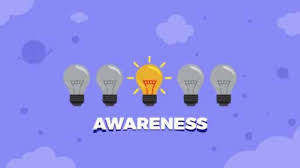Awareness is the ability to recognize, understand, and make sense of the world around us, as well as our own thoughts, feelings, and actions. It plays a critical role in personal growth, emotional intelligence, and fostering meaningful connections with others. Being aware means being present in the moment and open to the nuances of both internal and external experiences. This article explores the importance of awareness and how it can enhance various aspects of life.
Why Awareness Matters
Awareness is the foundation of change, growth, and improvement. Without it, it’s difficult to understand our motivations, address personal challenges, or interact effectively with others. Cultivating it allows us to navigate life with clarity and intention. Its benefits extend to personal development, relationships, and even professional success:
1. Self-Understanding: It helps us understand our emotions, strengths, and weaknesses, which is essential for personal development. It allows us to identify what drives us and where we need to grow.
2. Improved Decision-Making: With greater awareness, we become more attuned to the consequences of our choices. This leads to more informed and mindful decision-making, both in everyday life and in major life choices.
3. Enhanced Relationships: Being aware of others’ needs, emotions, and perspectives helps us communicate better, resolve conflicts, and deepen our connections with those around us.
4. Increased Emotional Intelligence: Awareness is a core element of emotional intelligence (EQ). The more aware we are of our emotions and the emotions of others, the better equipped we are to handle social situations and manage stress.
5. Mental Clarity and Focus: Increased awareness, especially through mindfulness, improves mental clarity, helping us stay focused and make better decisions without being clouded by distractions or biases.
Types
1. Self-Awareness: This is the ability to understand one’s own emotions, thoughts, and behaviors and how they affect others. Self-awareness allows individuals to recognize their strengths and areas for improvement, making it easier to set goals and cultivate personal growth.
2. Social Awareness: it involves understanding and recognizing the emotions, needs, and perspectives of others. It’s key to building empathy and fostering healthy relationships. Social awareness allows us to respond more appropriately in social contexts.
3. Situational Awareness: This refers to being aware of the environment and context in which one operates. It includes recognizing external factors, such as events, surroundings, and people, which influence our decisions and actions. Situational awareness is especially important in leadership, crisis management, and safety.
4. Mindfulness: Mindfulness is a form of it where individuals focus on being present in the moment, without judgment. It helps people cultivate attention, reduce stress, and become more attuned to their emotions and surroundings.

How to Cultivate Awareness
Awareness is a skill that can be developed through practice and intentional effort. Here are some strategies to enhance awareness in everyday life:
1. Practice Mindfulness: Regular mindfulness practices such as meditation, breathing exercises, or simply paying attention to the present moment can enhance both self-awareness and situational awareness. By training the mind to focus, we become more aware of our thoughts, feelings, and environment.
2. Engage in Self-Reflection: Take time to reflect on your actions, decisions, and emotional responses. Journaling or introspective thinking can help you gain insight into your motivations and identify patterns in behavior.
3. Listen Actively: Active listening involves focusing fully on the speaker, without distractions or forming judgments. This improves social awareness and helps us understand others’ perspectives more deeply.
4. Seek Feedback: Asking for feedback from others can provide valuable insights into our behavior and actions. Constructive criticism can open up new opportunities for growth and improvement.
5. Stay Curious: Cultivating curiosity about the world around you encourages awareness of new ideas, cultures, and experiences. A curious mindset fosters a sense of exploration and learning, helping you stay open to new possibilities.
6. Practice Emotional Regulation: Being aware of your emotions and learning how to regulate them can help you manage stress, anger, or anxiety. This promotes greater emotional intelligence and a more balanced approach to life.
The Benefits
The practice of awareness brings numerous benefits across personal, social, and professional domains:
1. Personal Growth: It accelerates self-improvement by helping individuals recognize their areas for growth and strengths. It provides clarity on the changes needed to reach personal and professional goals.
2. Better Decision-Making: With increased awareness, individuals can assess situations more clearly, avoid impulsive actions, and make more thoughtful and strategic decisions.
3. Stronger Relationships: By being more aware of others’ feelings and perspectives, we become better communicators and problem-solvers. This leads to healthier, more fulfilling relationships.
4. Reduced Stress and Anxiety: Mindfulness and self-awareness can reduce stress and anxiety by helping individuals stay grounded in the present moment rather than getting lost in worries or distractions.
5. Increased Focus and Productivity: Awareness improves attention and focus, which can boost productivity and efficiency in both personal tasks and professional responsibilities.
6. Enhanced Empathy: Being aware of others’ experiences and emotions fosters empathy, helping us connect with and support those around us.
Conclusion
Awareness is a powerful tool for navigating life with clarity and intention. By becoming more self-aware, socially aware, and mindful of our surroundings, we can improve our decision-making, relationships, and personal growth. Cultivating awareness requires practice, but the benefits—ranging from reduced stress to deeper connections—are well worth the effort. In a fast-paced world, being present and conscious of our emotions and the world around us is the key to a more fulfilling and meaningful life.


Pingback: How to Stay Consistent